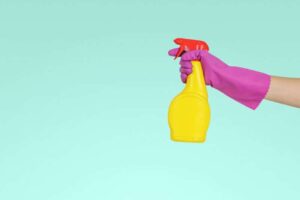Starting a cleaning business is not just buying equipment and hiring staff. You need to adhere to legal standards. Obtaining the necessary licenses, such as a cleaning business license or a house cleaning license, is important for legal compliance and building trust with clients.
These permits ensure your business operates within the law, help avoid fines, and build professional credibility. So, securing the appropriate cleaning services license is essential for establishing a reputable business.
But, what licenses are needed to start a cleaning business? Is there a difference between a commercial cleaning license and a house cleaning license? Keep reading and find out!
Types of Licenses Needed to Start a Cleaning Business
Cleaning business license
A cleaning business license is a legal authorization required for operating a cleaning service business. This license ensures that the business complies with local, state, and federal regulations.
A cleaning business license is important for anyone looking to open a legal cleaning service.
It is issued by the state’s Department of Revenue or state government. It formalizes the business’s legal standing and also allows you to operate within the framework of local regulations.
Cost and application process
The first step you need to take if you want to apply for a cleaning license is to contact the local business licensing office. You need to provide the necessary documentation and pay a fee, both of which can vary depending on your location. The cost usually includes a registration fee and an annual fee. A general business license typically costs anywhere from $50 to a few hundred dollars.
In many areas, you will need a vendor’s license. It allows your business to legally operate and sell services within a particular locale. Acquiring a vendor's license typically involves registering your business and meeting local regulatory requirements, which vary by location.
Then, choose if you’re operating as a sole proprietor, partnership, LLC, or corporation. Each option has different legal and tax implications, such as pass-through taxation for sole proprietors and partnerships, and personal asset protection offered by LLCs and corporations.
Register your business name (DBA) if you want to use a different name than your personal name. The “Doing Business As” process involves filling in the necessary paperwork and is usually priced between $10 and $100. Check out cleaning service business name ideas to get you started.
If you plan to work with hazardous materials, you might need specialized permits. Their price depends on local regulations and the type of permit, but it can range from less than $100 to several hundred dollars.
Bonds and insurance protect your clients against theft and guarantee the service promised will be delivered. Prices depend on the size of your business and the level of coverage you use, and typically range from a few hundred dollars annually to over a thousand dollars.
Use the North American Industry Classification System to find out which business license you need.
Commercial cleaning license
A commercial cleaning license is a specific business license required for companies that provide cleaning services to commercial properties, such as offices, retail stores, warehouses, and other business premises.
This license requires stricter standards because commercial cleaning is more complex and large-scale. For applying for a commercial cleaning license, you need to provide documentation that proves your capability to meet higher standards. This might include proof of additional training, insurance, and safety protocols.
To apply for a commercial cleaning license, you must submit training documentation and the application with the appropriate fees, then pass any necessary inspections to receive and maintain your license.
House cleaning license
A house cleaning license, often referred to as a residential cleaning license, is a legal authorization required for businesses that provide cleaning services to private homes. This license ensures the business complies with local, state, and federal regulations.
If you compare a commercial cleaning license to a house cleaning license, the costs can be different. Commercial cleaning license is often pricier, because of the broader scope of work and higher business revenues.
In some states, you can hold both licenses simultaneously. This way, you can cover a wider range of clients.
Enhance Your Cleaning Service Business with Trafft
Looking for an easy-to-use solution that lets you manage your appointments, clients, employees, and payments? Look no more - Trafft is a dream come true for every cleaning business owner!
- No website? No problem - Trafft generates a booking page for you in less than 5 minutes. Already have a website? Embed Trafft's booking form and start accepting bookings in no time!
- With Trafft, clients can choose the type of cleaning service they want, pick a date and a time slot, and even choose additional services like carpet cleaning or window washing. The possibilities are endless.
- Also, you'll never have to worry about clients forgetting about their cleaning appointments - Trafft sends automated reminders so they always know when to expect you.
- If you have employees, you can manage their profile, or even assign one employee to a specific cleaning job.
- When it comes to paying, Trafft is your trusted partner. Clients can pay online through services such as PayPal, Stripe, Mollie, and Authorize.Net ensuring transactions are secure, quick, and convenient.
These are just some of the benefits this booking software has in store for you; don't forget to check out all Trafft's features and see why it's worth your time.
And the best part? Trafft is completely FREE for up to five users!
So why wait?
Do You Need a License to Start a Cleaning Business?
Yes, obtaining a license is necessary if you want to run a successful cleaning business and watch it grow.
Operating a business without a license is considered fraud and is illegal in most states. You can also face penalties and fines, which may be considered an easier consequence, and arrest as the worst-case scenario.
Penalties for operating a business without a license can be serious, and you don’t need this kind of fuss when trying to establish a reputable company.
These are the legal requirements for operating a cleaning business:
- Business registration - sole proprietorship, partnership, LLC, or corporation
- Obtaining licenses and permits - a general business license, a vendor's license, or a special cleaning business license, depending on the state and municipality
- Insurance - liability insurance that covers accidents or damages, and worker's compensation insurance (mandatory if you have employees)
- Health and safety regulations (Occupational Safety and Health Administration standards) - proper handling of chemicals or waste, and employee training
- Employment laws - fair labor practices, minimum wage requirements, anti-discrimination laws, and proper record-keeping for employees
- Tax compliance - obtaining an Employer Identification Number (EIN) through the IRS
If you want to check whether a cleaning license is required in your area, start by researching online, especially on state government and local municipality websites.
Plus, you could reach out to local business development centers or similar organizations. They can provide resources and connect you with the right authorities to guide you through the licensing process.
How to Get a Cleaning License
To get a cleaning service license, find out what specific licenses, permits, and registrations you need.
An easy first step is to contact relevant government departments, such as the Department of Revenue, Commerce, or Taxation, or a specific licensing authority for guidance. Local city halls or Small Business Development Centers can also provide valuable information on licensing requirements.
It’s good you consult with a lawyer to understand all licensing laws applicable to your business. They will give you advice on specific circumstances of your business.
When you are ready to apply for a cleaning license, you’ll need to submit an application form with the necessary supporting documents. These are usually your business’s name and address, your personal contact information, a description of your business activities, and your Federal Employer Identification Number (EIN).
Remember, EIN is necessary for opening your business bank account and applying for various licenses, but also for tax purposes.
You should also pay an application fee, which varies depending on license type and location.
The last step is to keep track of expiration dates so you can renew them on time. Licenses are typically renewed every year, but some like DBA registrations may last up to five years.
Cleaning Business License Cost
These are all the costs of operating a cleaning service license:
- General business license - from $50 to a few hundred dollars
- DBA registration - between $10 and $100
- Specialized permits - from less than $100 to a few hundred dollars
- Bonds - a few hundred dollars annually
- Insurance - from a few hundred dollars to over a thousand annually
- Renewal fees - can sometimes be lower than the initial application fee
Remember, costs can vary depending on the location and business type, so check it with your local authorities.
How Long Does It Take to Get a Cleaning Services License
The average processing time for each license differs. For example, a basic business license may be issued in a few weeks, while specialized cleaning business permits might take several months
The timeline for receiving your cleaning service license depends on several factors. These include the completeness of your application, the specific requirements of local regulatory bodies, and the volume of applications they are processing at the time.
To speed up the process, make sure your application is complete and all documents are filled out and submitted correctly. Also, hiring a professional like a licensing consultant or a lawyer who knows local business rules can help make this process smoother and prevent delays.
Closing Thoughts on Cleaning Services Licenses
Obtaining the appropriate licenses isn’t just a bureaucratic formality, it’s a way to prove your legitimacy and trust and foster long-term success. Operating without a license can lead to serious penalties, spoil your reputation, and slow down growth
It’s very important to understand the specific requirements of your area to ensure you meet all regulatory obligations. Good luck with your new business!
Looking for More Cleaning Business Resources?
For more tips and tricks on how to start, manage, and grow your cleaning business, check out the following articles:
- How Much to Charge for House Cleaning in 2024
- How Much to Charge for Commercial Cleaning: A Beginner’s Guide
- Cleaning Business Success Stories to Inspire You
- How to Start a Cleaning Business & Become Successful
- How to Start a Remote Cleaning Business
- How to Get Clients for Your Cleaning Business






